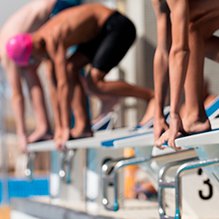The CEIO-UEM promotes the Olympic values of effort, friendship, peace, solidarity and fair play, as well as the educational mission of sport and respect for human rights.
The Olympic Studies and Research Centre is coordinated by the Sport, Society and Olympic Games research group, which brings together researchers in social sciences and humanities from the Faculty of Physical Activity and Sport Sciences. Since 2022 the centre is directed by Dr. Carlos García, principal investigator of the group.
In addition, the CEIO-UEM is part of the network of Spanish CEIOs coordinated by the Spanish Olympic Academy chaired by Mr. Raúl Chapado.
What are the Olympic Studies and Research Centres?
The Olympic Studies and Research Centres (OSRCs) are academic entities committed to research, education, and the dissemination of the Olympic legacy. As such, they emerge from universities and their work is recognised by the International Olympic Committee (IOC). They contribute to the development of research and are also the link between the IOC and the academic community, as well as contributing to the dissemination of knowledge about the Olympic Movement and Olympism.
The Olympic Studies and Research Centres in the world
Today, the network of OSRCs is composed of more than 50 centres on five continents that collaborate in the dissemination of knowledge about the Olympic Movement and Olympic values through their coordination with the IOC's Olympic Studies Centre, their national Olympic academies and with sports bodies and public institutions.

Social commitment
The Centre wants its scientific and educational activities to be of social benefit, collaborating in the achievement of the UN Sustainable Development Goals (SDGs), specifically access to health and wellbeing through sport (SDG 3), gender equality in sport (SDG 5) and the development of sustainable cities and communities through sport (SDG 11). It also offers its experience and knowledge to society to collaborate in projects that contribute to these goals.